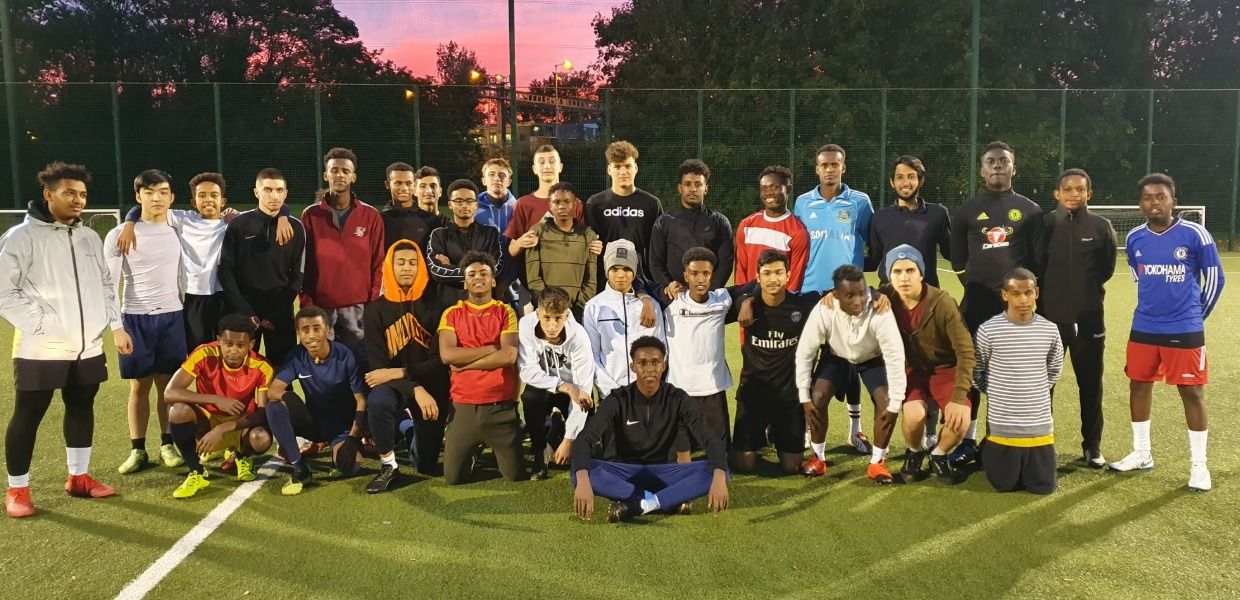Why did you set up Sports Against Racism Ireland?
There's a problem in the Irish Republic with xenophobia - it’s a small island, small population. Xenophobia can lead on to racism so we wanted to interrupt that. In Dublin, there were a lot of migrants coming in as refugees or waiting for asylum. In 1997, myself, Frank Buckley who had previously worked in sport, and a renowned photographer called Perry Ogden, who was working with kids in Dublin's inner city, set up Sports Against Racism Ireland as a volunteer-driven organisation.
Why did you want to focus on sport?
Sport is universal. Almost every country in the world has its own traditional sport. People come into the country with their own games. Respecting them and incorporating them into what we do is very important.
We punch above our weight in Ireland in terms of sporting achievements. We have a big cache of Olympic gold medals but nowhere to display them. Ireland doesn’t have a sports museum but we do have big archives of material. SARI has a website and social media channels but that’s as far as it goes in terms of digital activity.
One of our previous projects looked at how storytelling in sports could influence positive change in society in terms of cultural integration and social inclusion. We came into contact with Europeana Sport through one of our contacts in that project. This could be a unique opportunity to start thinking about creating a digital sports archive - we’ve been talking to the Olympic Federation of Ireland about becoming partners to do that.
Can you tell us about what you do at the moment?
Our Soccer Fest football tournament brings different community groups together. Within five years, Soccer Fest became the biggest intercultural seven-a-side football tournament in Europe with a volunteer committee and volunteer staff of 80 people. We’re still waiting to hear if we can run a scaled-down version of Soccer Fest this year. We usually have 32 men’s teams and 12 women’s teams. This year, it’ll be eight men’s and eight women’s.
SARI SOCCERFEST TRAILER from Sport Against Racism Ireland on Vimeo.
Our Soccernites programme involves more than 40 young people, mostly unaccompanied minors who come into the country from as far as Afghanistan, Pakistan, Eritrea, Ethiopia. And they all play football together. And Hijabs and Hat-tricks brings young Muslim women into sport, mainly football. And from that, then into the community to become active citizens.
Laura Rafferty and Raihana Zeroug from Sport Against Racism Ireland on Vimeo.
We run education programmes too. We did a pilot called ‘Ali’s Bicycle’ with the Muhammad Ali Center in Kentucky, USA, in response to the problem of homophobic and racist bullying. The reason Mohammed Ali got involved in boxing was that his bicycle was stolen when he was a kid. A police officer told him, ‘Don't talk to me, go down to the boxing club’. So that's how he started. It's an amazing story. Our kids relate to it.
We have a big international agenda. We partner with UNESCO, we’re part of the Coaches Across Continents programme, and Street Football World, in Berlin. We’re part of the Corporate Social Responsibility programmes in FIFA and UEFA. There's a strong human development element to what we do. We do a lot of work on the Sustainable Development Goals for example.
What activities have you got coming up at the moment?
10 years ago, one of the members of our Insaka Football Club, 15-year-old Tayosi Shittabey, was murdered in a racist attack. It was horrific.
‘Insaka’ is a word from Zambia and it means together, whether physically or conceptually. It's a thought space or a real space where the elders in the community pass on knowledge to the younger people. The Insaka Football Club was set up with support from Glentoran Football Club and had players from 15 different countries.
Our commemorative event for Tayosi has been delayed this year because of COVID. We’re hoping it’ll be part of Football Against Racism in Europe (FARE) as part of FARE Action weeks. So it’ll be a pretty big event in Dublin.
How can cultural heritage institutions get involved with SARI?
I’m a visiting lecturer in the FIFA Master programme at De Montfort University in Leicester, UK and we are part of the History of Sport Department so I’m interested in partnering with organisations or individuals who want to get involved with us, particularly in doing more research. SARI is a partner in the pan-European project ‘Sport it Right’ that uses the history of sport to focus on issues of discrimination in and through sport today.
Find out more about SARI at SARI.ie and follow them on Twitter, Facebook, Vimeo and Flickr or email [email protected].


